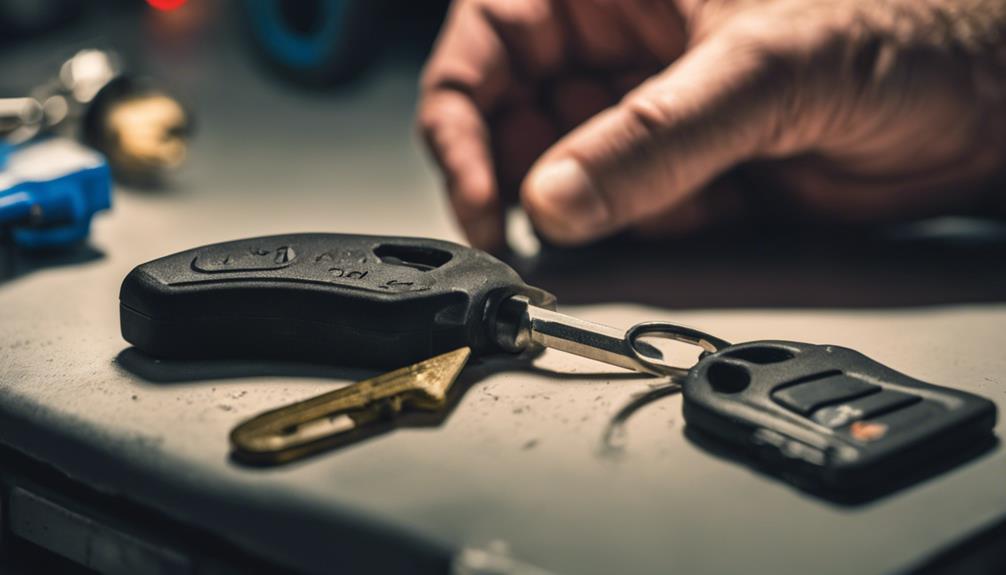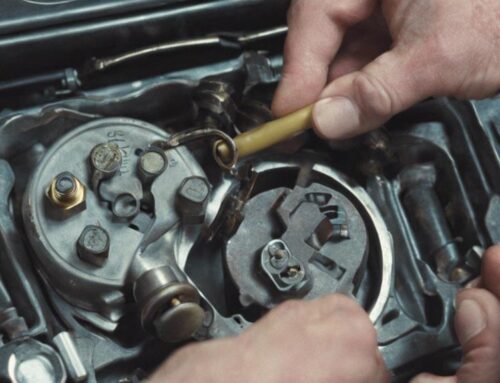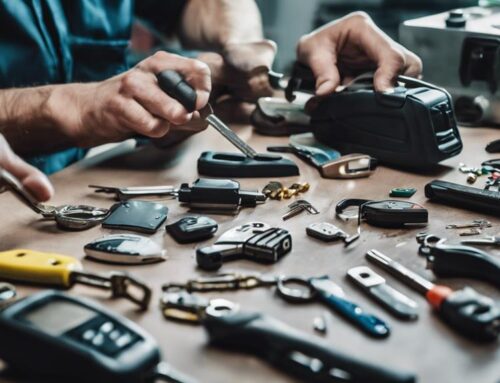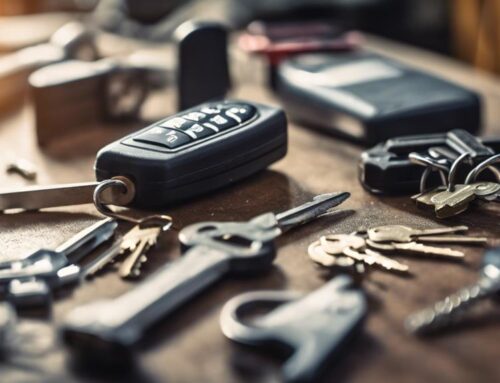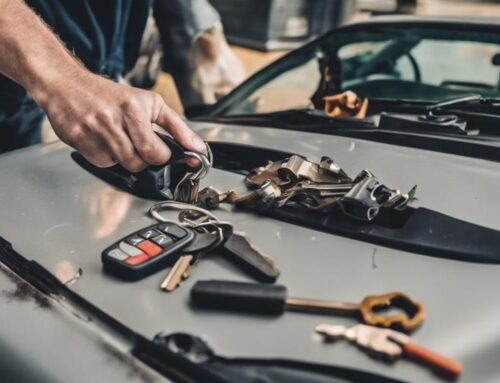Did you know that many car owners face unexpected troubles with their transponder keys? These issues can lead to inconvenient situations, but you can take steps to minimize the risks. Understanding the common problems—like battery failures and signal interference—can save you from the hassle of reprogramming. You might be surprised by how simple maintenance tips can make a difference, yet many overlook them. What if you could keep your key in top condition and avoid those frustrating moments altogether?
Key Takeaways
- Regularly inspect your transponder key for physical damage, scratches, or dirt to ensure optimal functionality and prevent recognition failures.
- Check and replace the key's battery every 2-3 years to maintain communication with the vehicle and avoid unexpected issues.
- Store your keys in protective cases and away from extreme temperatures to preserve their integrity and prevent damage.
- Avoid proximity to metal objects and high-voltage devices to reduce signal interference that can hinder key performance.
- Schedule routine maintenance for your key and ignition system, including cleaning and testing, to ensure reliable operation and prevent reprogramming.
Understanding Transponder Keys
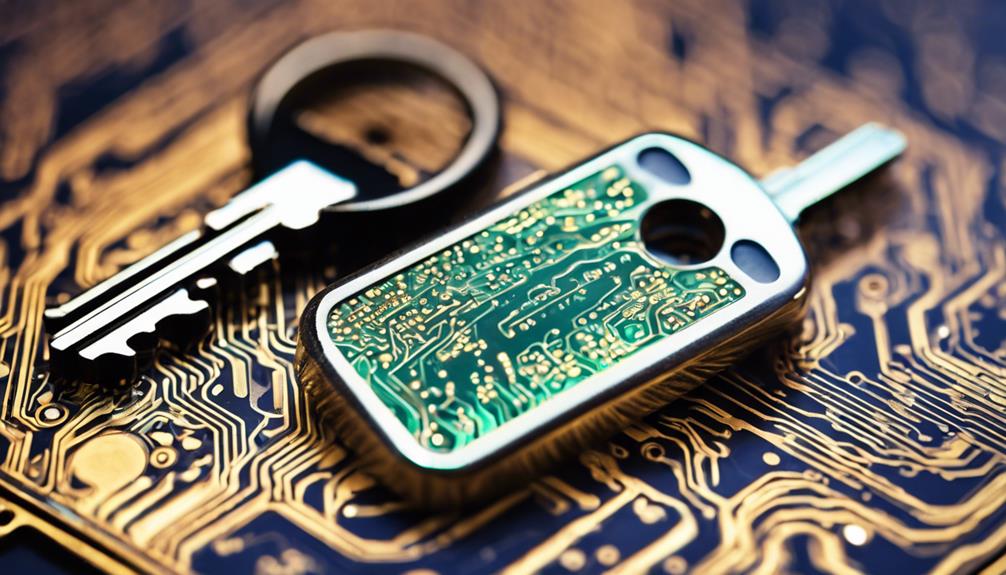
Transponder keys are essential components in modern vehicle security systems, providing a higher level of protection against theft. Utilizing transponder technology, these keys contain a microchip that communicates with your vehicle's ignition system. When you insert the key, the vehicle sends a signal to the chip, which then transmits a unique code back to the ignition. If the code matches, the engine starts. Key programming is vital for ensuring that both the key and vehicle are synchronized, allowing for seamless operation. Without proper programming, your transponder key won't function, leaving you vulnerable to unauthorized access. Understanding this technology empowers you to maintain your vehicle's security effectively and avoid potential issues that could compromise your investment. Additionally, it's important to be aware of common issues with transponder keys, such as programming challenges and potential reprogramming needs to address them efficiently.
Common Issues Encountered
When using transponder keys, you might encounter several common issues. Key recognition failures, battery depletion, and physical damage can all disrupt your access to your vehicle. Understanding these problems can help you troubleshoot effectively and maintain the functionality of your transponder key.
Key Not Recognized
A key not being recognized can be a frustrating experience for any vehicle owner. This issue often arises from key cloning attempts, which compromise the security features of your transponder key. When unauthorized duplicates are made, your vehicle's system may reject the key, preventing access. To avoid this, always use a certified locksmith or dealership for key programming. Additionally, verify that your key isn't damaged or dirty, as physical impairments can hinder recognition. Regularly inspect your key's condition and avoid exposing it to extreme temperatures, which can affect its internal components. By maintaining your key's integrity and understanding the risks of cloning, you can enhance your vehicle's security and reduce the likelihood of encountering recognition issues. Locksmiths have the expertise to handle keyless entry remotes, providing solutions for different remote types Can Locksmiths Handle Keyless Entry Remotes.
Battery Depletion Problems
One of the most common issues you might face with transponder keys is battery depletion. When this happens, your key may fail to communicate with your vehicle, leaving you stranded. To avoid this frustrating situation, prioritize transponder key maintenance and keep an eye on your key's battery life. Here are some battery replacement tips to take into account:
- Regularly check battery status during routine vehicle maintenance.
- Replace the battery every 2-3 years, even if it seems functional.
- Use high-quality batteries recommended by your key manufacturer.
- Store your key in a safe, dry place to prevent corrosion. Additionally, it's crucial to understand the key fob programming process to guarantee efficient battery replacement and key functionality. Unlocking the Process: Key Fob Programming Explained
Physical Damage Risks
Over time, physical damage to transponder keys can considerably impact their functionality and reliability. Scratches, cracks, or bending can compromise the internal circuitry, leading to decreased transponder key safety. You may not realize it, but even slight physical wear can disrupt the communication between the key and the ignition system, resulting in operational failures. To avoid these issues, handle your transponder key with care, and store it in a protective case. Regularly inspect it for any signs of damage, and replace it immediately if you notice deterioration. By maintaining the integrity of your transponder key, you guarantee consistent performance and reduce the risk of reprogramming due to physical damage. Prioritizing physical preservation is essential for peak key functionality. Additionally, understanding the cost of programming a transponder key can help you appreciate the importance of protecting it Understanding the Cost of Programming Transponder Keys.
Key Battery Problems
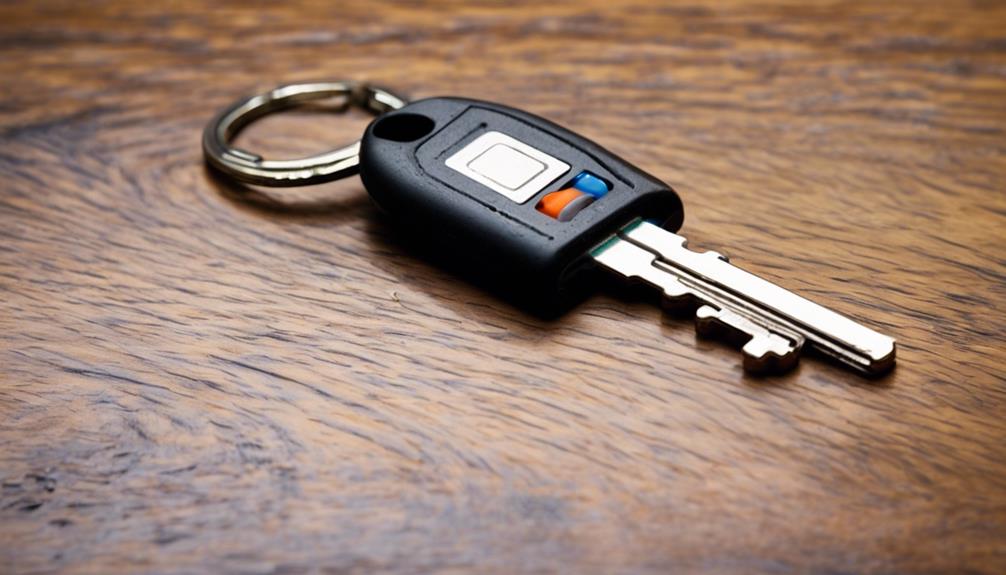
Transponder keys rely on a small battery to communicate with your vehicle's ignition system. If the battery dies, you'll face issues starting your vehicle, leading to potential frustrations and the need for key replacement. To avoid this, keep an eye on the following:
- Battery Life: Regularly check the battery's condition and replace it as needed.
- Signs of Weakness: If your key struggles to open or start the ignition, it might be time for a battery change.
- Transponder Programming: After a battery replacement, verify the key is properly reprogrammed.
- Spare Key: Always have a backup key ready to minimize disruptions. Remember, reliable locksmith services are available 24/7 for key fob needs anytime.
Signal Interference Factors
While you might not realize it, various factors can interfere with the signal between your transponder key and the vehicle's ignition system, leading to starting issues. Understanding these interference sources is essential for maintaining peak performance.
Here's a breakdown of common signal interference factors:
| Interference Source | Effect on Signal | Signal Shielding Solutions |
|---|---|---|
| Metal Objects | Reflects or absorbs signals | Keep key away from metal items |
| Electronic Devices | Causes electromagnetic noise | Limit proximity to devices |
| Radio Frequency Signals | Competes with transponder frequencies | Use shielding pouches or cases |
| Weather Conditions | Attenuates signal strength | Park in sheltered areas |
| Battery Issues | Weakens signal transmission | Regularly check and replace batteries |
Physical Damage Risks
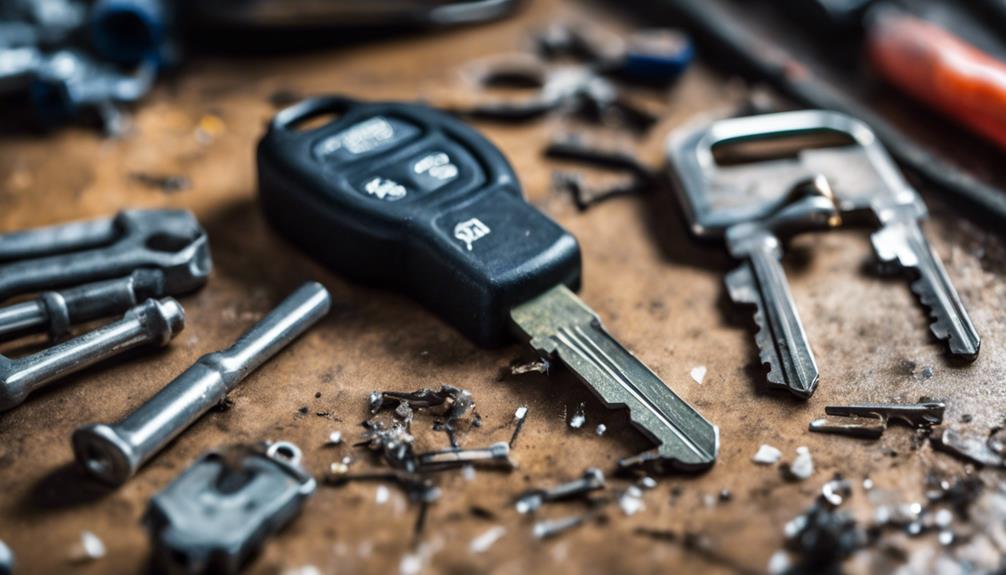
When using transponder keys, you need to be aware of physical damage risks that can compromise their functionality. The integrity of the key case plays a vital role in protecting the embedded chip, which is essential for the key's operation. Implementing proper chip protection measures can help mitigate these risks and guarantee reliable access to your vehicle. It's significant to mention that DIY key fob programming may lead to unintended physical damage, so considering Professional Locksmith Services can guarantee a safe and effective reprogramming process.
Key Case Integrity
Many users overlook the importance of key case integrity, which can markedly impact the functionality of transponder keys. The key design directly influences its durability and security features. A compromised case can expose the internal components to damage, leading to malfunction. To guarantee longevity and peak performance, consider the following:
- Avoid dropping your key; impacts can crack the case.
- Store your key in a protective case when not in use.
- Regularly inspect for signs of wear, such as scratches or fractures.
- Keep your key away from extreme temperatures that may warp the casing.
- To further protect your key, consider utilizing a protective case for added security and longevity.
Taking these precautions will help maintain your transponder key's integrity, guaranteeing it continues to function effectively without the need for costly reprogramming.
Chip Protection Measures
Transponder keys rely on a small chip to communicate with your vehicle's ignition system, making chip protection measures essential to their functionality. Physical damage can compromise these chips, leading to costly reprogramming. To mitigate risks, consider implementing security enhancements and employing effective programming techniques.
| Risk | Mitigation Strategy |
|---|---|
| Water Exposure | Use a waterproof case |
| Dropping the Key | Opt for a keychain holder |
| Extreme Temperatures | Store in a climate-controlled environment |
| Electrical Interference | Avoid proximity to high-voltage devices |
Importance of Routine Maintenance
Routine maintenance of your transponder key system is vital for guaranteeing peak performance and reliability. Regular checks can considerably enhance your transponder key security and prevent issues that may require reprogramming. Here are some routine maintenance tips you should follow:
- Inspect the key regularly for wear and tear.
- Check battery levels to guarantee optimal functionality.
- Clean the key and ignition slot to prevent dirt buildup.
- Test the key's response to your vehicle periodically.
It's imperative to stay proactive in maintaining your transponder key system to avoid unexpected issues, as highlighted in Understanding Transponder Key Programming Made Simple.
Low Rate Locksmith Services
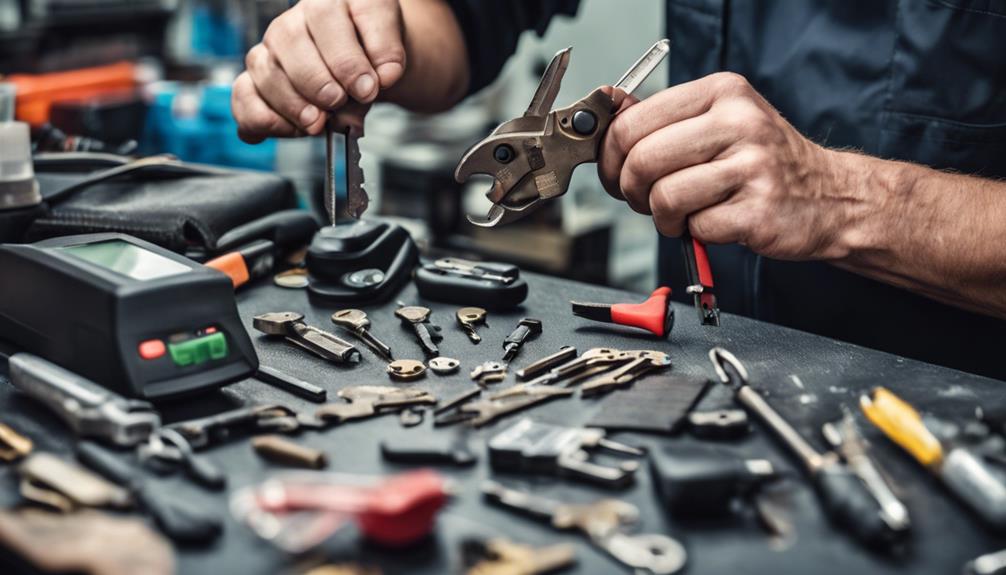
When you're in a bind and need a locksmith, low-rate locksmith services can seem like an appealing option. However, it's vital to weigh cost comparisons against service reliability. Understanding Key Fob Replacement Costs and Factors can help you make informed decisions. While lower prices might tempt you, they often correlate with subpar service or unqualified technicians. A poorly executed job can lead to more significant issues, especially with complex systems like transponder keys, potentially resulting in costly reprogramming. Before committing, evaluate the locksmith's credentials, reviews, and warranty policies. Remember, saving a few bucks now may cost you more in the long run if the service doesn't meet your expectations. Prioritize quality and reliability to guarantee your security systems function correctly and avoid unnecessary headaches later.

